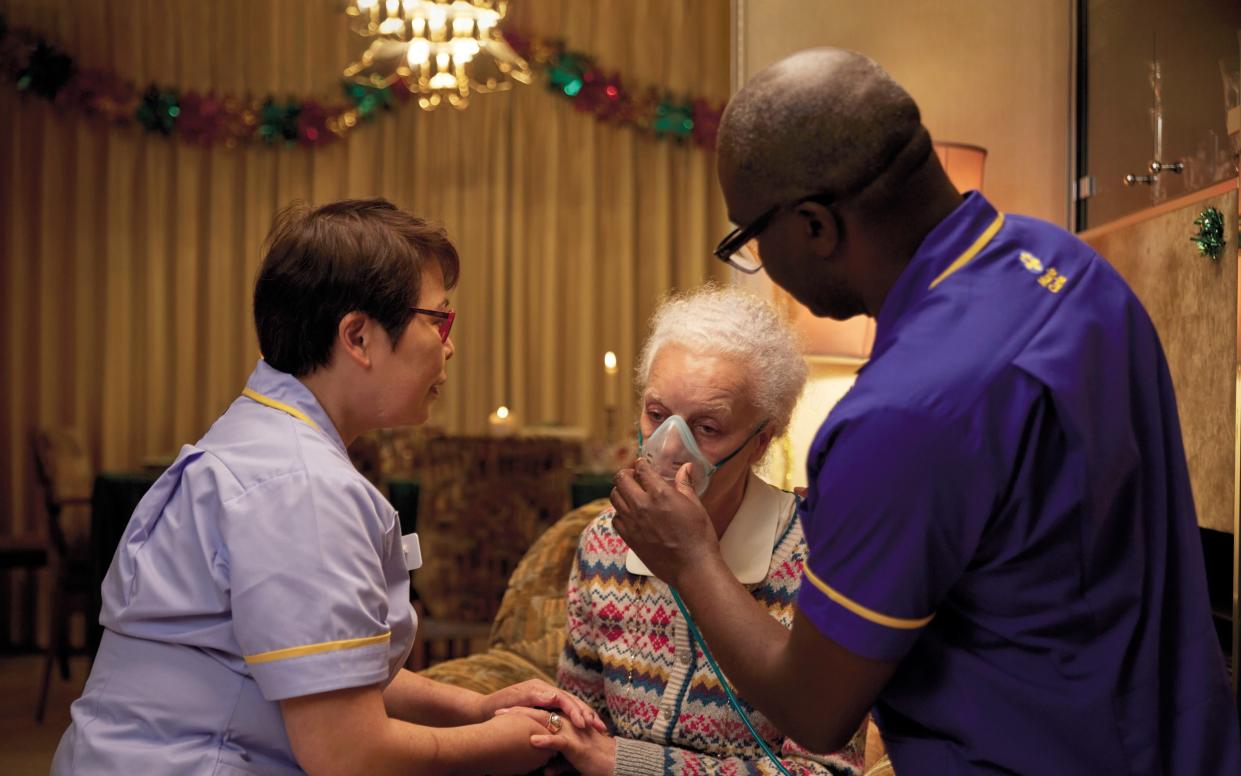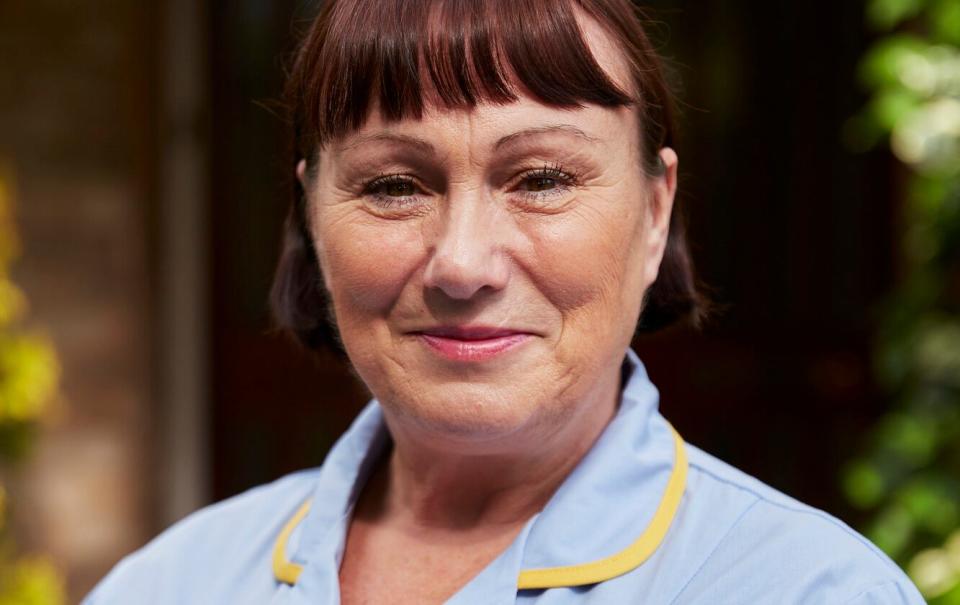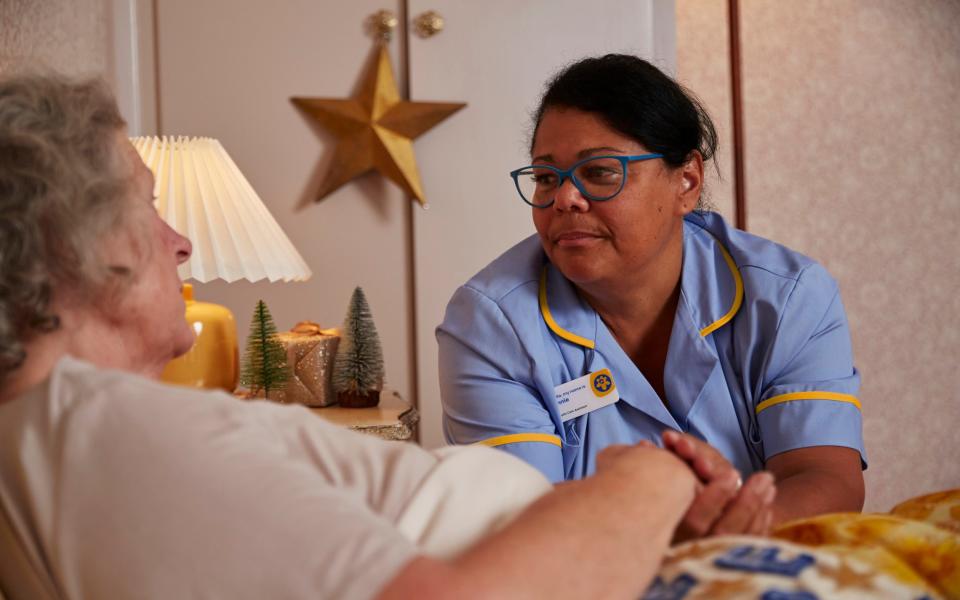A Marie Curie nurse was there in our darkest hour – I knew I could do the same for someone else

The night her father died was among the worst evenings of 60-year-old Cherry Rowland’s life. He’d been taken into hospital a few weeks previously but developed a chest infection and pneumonia. The doctors did all they could but eventually there was nothing left to do.
“Dad always told me he wanted to come home and I insisted to the doctors that was what we needed to do,” she remembers. “It was me and him against the world, always had been, and it was incredibly important for me to be able to do that for him. We took a hospital bed home; there was a lot of equipment. It was all very daunting. I didn’t realise what I was taking on but I just wanted to fulfil my dad’s wishes.”
At 10pm there was a knock at the door. A big man greeted Cherry and introduced himself as a Marie Curie overnight nurse and that he’d be there to support them. “I couldn’t go to bed and it was nice to have someone else there to talk to, so I wasn’t alone,” she smiles. “It made such a difference to have that care worker with me and the next morning my father died peacefully and in his own home.”

Though Cherry had only heard about the charity in passing, she was immensely moved and inspired by the Marie Curie nurse who sat beside her in her darkest hour. She took some time to deal with her own grief, but then decided to follow in his footsteps and applied to become an overnight nurse herself.
Based in Essex, Cherry works from 10pm until 6am, supporting terminally ill patients in their own homes. “The aim is to care for a patient overnight so families can get some rest,” she explains. “Sometimes the patient has no one else so we sit with them and meet their needs. Some are very much at the end of their lives so they may well be unconscious. We just sit with them and make sure they’re comfortable; if things change we can inform their families so they can spend some time with a patient before they pass away. Other times I’ve gone to patients who are awake and aware and want to talk to me all night. They tell me stories about their lives, their relationships, how they met their husband or wife. You never know what to expect.
“For families, by that stage it has all become very medical and a lot of people feel so surrounded by all that. Sometimes it’s nice for the family member to have someone new to talk to, which is where we come in.”
The service is very busy so Marie Curie has to operate a priority list, focusing on the patients who are closest to the end of their lives, but occasionally Cherry will visit the same house patient twice or three times, building a good rapport with the family. That can make the job difficult at times.
“I don’t think any training could allow you to fully leave that at the door,” Cherry admits. “My whole team has one thing in common and that’s compassion. This job is about wanting to help. You can’t change anything but you can make a difference. I think people are very grateful that you’re helping them fulfil their loved ones’ wishes. I’ve seen lots of wonderful things and lots of tragic things, but you have to take them as memories and move on; that’s how you survive in this job.”
One story that Cherry thinks she’ll remember for a long time came just a few weeks ago, when she went to visit an old lady whose final wish was to spend her last night in her own bed with her husband.
“You don’t know quite what you’re walking into with a case like that – it can be hard to attend to somebody if they’re in their own bed rather than a hospital bed,” says Cherry.

“When I got there I was given a chair in the corner and I just sat there quietly and tried to fade into the background until I was needed,” she continues. “The husband kept his arm around his wife all night, kissing her, whispering ‘I love you, I love you, you’ve been such a good girl, you’ve always been my girl’. She was unconscious the whole time but it was beautiful. She died the following morning, but what a way to go. It must have been everything she wished for, dying surrounded by such love. It went on all night, he never stopped telling her how much he loved her. It was a truly beautiful thing to see. That couldn’t have happened in the hospital. To be a part of that was immensely moving. I was taken into that situation and had the privilege to listen to this man’s undying love for his wife. How beautiful is that?”
Through her own experience with her father, Cherry gained an appreciation of just how exhausting it can be for families who want to give their loved ones a ‘perfect’ death. “You see all these films with beautiful deaths, the family all around, slowly drifting off,” she says, “but most people aren’t prepared for the reality of it. It’s very scary and overwhelming. The most common thing I hear from families is how tired they are, and I know because I’ve been there. My priority is always to support the family and let them know what a wonderful thing they’re doing because sometimes they don’t get told that enough.”
Though family and friends sometimes worry that her job must be depressing, Cherry says that she gets a lot of job satisfaction. “It’s a real passion of mine,” she says. “To know that because of the support that Marie Curie gives, families are able to have those beautiful moments together is just wonderful. It’s an honour to do this job.”
Marie Curie is one of four charities supported by this year’s Telegraph Christmas Charity Appeal. The others are Go Beyond, Race Against Dementia and the RAF Benevolent Fund. To make a donation, please visit telegraph.co.uk/2023appeal or call 0151 284 1927